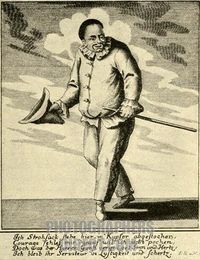Annotation:Jack Pudding: Difference between revisions
No edit summary |
No edit summary |
||
| Line 3: | Line 3: | ||
<p><font face="garamond, serif" size="4"> | <p><font face="garamond, serif" size="4"> | ||
'''JACK PUDDING'''. AKA and see "[[Merry Andrew]]," "[[Step Stately (1)]]." English, Country Dance Tune (6/8 time). A Minor. Standard tuning (fiddle). AAB. The melody was first published by John Playford in his '''English Dancing Master''' [http://www.izaak.unh.edu/nhltmd/indexes/dancingmaster/] (1651), and was retained in the long-running series through the 8th edition of 1690, then published by John's son, Henry. Beginning with the 4th edition of 1670 the alternate title "Merry Andrew" was given for the tune. | '''JACK PUDDING'''. AKA and see "[[Merry Andrew]]," "[[Step Stately (1)]]." English, Country Dance Tune (6/8 time). A Minor. Standard tuning (fiddle). AAB. The melody was first published by John Playford in his '''English Dancing Master''' [http://www.izaak.unh.edu/nhltmd/indexes/dancingmaster/] (1651), and was retained in the long-running series through the 8th edition of 1690, then published by John's son, Henry. Beginning with the 4th edition of 1670 the alternate title "Merry Andrew" was given for the tune. | ||
[[File:jackpudding.jpg|200px|thumb|left|Hanswurst or Jack Pudding]] | |||
<br> | <br> | ||
<br> | <br> | ||
Revision as of 18:05, 17 January 2012
Tune properties and standard notation
JACK PUDDING. AKA and see "Merry Andrew," "Step Stately (1)." English, Country Dance Tune (6/8 time). A Minor. Standard tuning (fiddle). AAB. The melody was first published by John Playford in his English Dancing Master [1] (1651), and was retained in the long-running series through the 8th edition of 1690, then published by John's son, Henry. Beginning with the 4th edition of 1670 the alternate title "Merry Andrew" was given for the tune.

A 'Jack Pudding' is a buffoon who performs pudding tricks, such as swallowing a certain number of yards of black-pudding (i.e. blood pudding in a sausage casing). There are many such figures in Northern European tradition: to the Dutch he is Pickel-herringë; the Germans call him Hans Wurst (John Sausage); the Frenchman, Jean Potage; the Italian, Macaro'ni; and the English, Jack Pudding. Later the term appears to have been applied to a jester, harlequin, or a Punch-like clown figure.
Source for notated version:
Printed sources: Barlow (Complete Country Dance Tunes from Playford's Dancing Master), 1985; No. 46, p. 26. Raven (English Country Dance Tunes), 1984; pp. 32 & 42 (the latter is a facsimile copy of the Playford original).
Recorded sources: Harmonia Mundi 907101, The King's Delight - "17c. Ballads for Voice & Violin Band" (1993. Appears as the tune for "A Light Hearts a Jewell").
See also listing at:
Jane Keefer's Folk Music Index: An Index to Recorded Sources [2]
